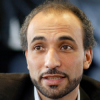Tariq Ramadan

Tariq Ramadan
Tariq Ramadanis a Swiss academic, philosopher and writer. He is the professor of Contemporary Islamic Studies in the Faculty of Oriental Studies at St Antony's College, Oxford and also teaches at the Oxford Faculty of Theology. He is a visiting professor at the Faculty of Islamic Studies, the Université Mundiapolisand several other universities around world. He is also a senior research fellow at Doshisha University. He is the director of the Research Centre of Islamic Legislation and Ethics, based in...
NationalitySwiss
ProfessionWriter
Date of Birth26 August 1962
CountrySwitzerland
Malaysia is a country unlike any other: Full of promise and fragility. Its history, cultural and religious diversity make it a rich, compelling and surprising land.
We cannot have a free market since it does not really set us free. It's free for interest, speculation and consumerism to create false needs.
I am not a politician. I have often been approached in this regard, but I have always declined these sorts of offers. I view myself as an independent, critical intellectual, as someone who tries to stimulate thought on the left and the right, to encourage intellectual evolution.
Nature is telling us that if you don't respect the environment then you are living with artificial needs and a consumerism that is destroying the very conditions we need to survive.
Advertising, music, atmospheres, subliminal messages and films can have an impact on our emotional life, and we cannot control it because we are not even conscious of it.
Cultures are never merely intellectual constructs. They take form through the collective intelligence and memory, through a commonly held psychology and emotions, through spiritual and artistic communion.
We need to challenge the dominant culture: by ethics, principles and values.
We need to deal with three things that are important: first, we need a very deep reconsideration of how we are dealing with the economy. Second, there must be a very deep reconsideration of our way of life. We cannot simply adopt American-style consumer culture. To Islamize that is to de-Islamize Islam.Thirdly, it is important for us to understand the economy and the environment are common challenges for everyone. This is where the singularity of Islamic principles needs to join the universal values that we share with others.
Proud to be a Muslim isn't a stamp you have on your heart, it's a light you have in your heart.
We are not competing for the good when we only compete for numbers, being preoccupied with how many converts we are gaining. The true competition for good only happens when we are implementing our values of justice.
In Islam, rules are important, like the Prophet said innal halaala bayyinun, wa innal haraama bayyinun ["what is halal is clear, what is haram is clear"]. The goal is not to diminish the importance of rules, but to have the right priorities.
The universe is pregnant with signs that recall the presence of the Creator.
It is only through the opposition of ideas that we can learn to be self-critical, to work towards intellectual humility.
History is replete with ideologies of freedom, justice, liberation of the downtrodden and the exploited, that have been turned against the very people they had mobilised, or that have reproduced the same logic of exclusion and terror toward those whom they claimed to set free.